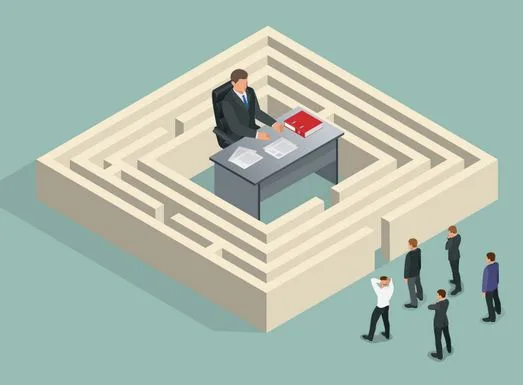Dealing with the Ecuadorian bureaucracy: Advice for expats and prospective expats
By Lee Shrader
A few thoughts about interacting with government agencies in Ecuador. First, let me say that this will be old news to those of you who have been in Ecuador a while, but might be helpful to those newly arrived or looking to come to Ecuador. My thoughts were prompted by someone who recently posted  something to the effect that “they would wait until there was official information posted online from the government in English.”
something to the effect that “they would wait until there was official information posted online from the government in English.”
My wife and I have obtained professional visas, driver’s licenses, IESS insurance and SRI registration. I have also obtained an Ecuadorian Amateur Radio operator’s license. At no time did we find complete and accurate information posted online – in English or Spanish. Government personnel were generally helpful and sometimes more than one would expect and, yes, back when we got our visa’s there was information online in English about what was required, but it was hardly complete. In the beginning, I was fortunate to get some assistance from Visa Angels to help deal with a bad fingerprint problem. Since then, I have relied on my wife who fortunately speaks very good Spanish and is a very patient person.
For most interactions with the Ecuadorian government, there are generally two routes available:
- Go it on your own. I wouldn’t recommend this unless (a) you (or a spouse or other friend that will help you) has a decent command of Spanish and (b) you have the patience to visit the government office(s) several times—usually, at least three times—to get what you need accomplished, or
- Hire a knowledgeable and experienced facilitator or lawyer. These come in various sizes and shapes from those who offer minimal advice and assistance to those who will do almost everything for you—more about that later. Recognize that no matter who helps you, you will usually have to round up some paperwork on your own (e.g. fingerprints for background checks).

Navigating the Ecuadorian bureaucracy is not easy.
Whichever, path you take, recognize that whatever documents are required will generally have to be translated into Spanish. This is a Spanish-speaking country after all. And while some folks may have gotten away without using a “certified” translator, most, if not all agencies will require that the translator have their translation notarized by an Ecuadorian notary. So, expect to pay for the translation and for the notary fee.
Further, if your documents are from a “foreign” (not Ecuador) country they will generally have to be authenticated. In the U.S., that means obtaining an apostille, which is an internationally accepted verification that the notary who signed the document is in good professional standing. For some government documents, this is rather straightforward, although another expense. For example, FBI background checks are authenticated by the U.S. State Department. Government documents such as birth certificates and state background checks are authenticated by the state in which they are issued. Getting an apostille is not automatic. It generally requires completing a request for authentication and submitting a fee to the authenticating agency.
However, for some documents authentication is somewhat more difficult. For example, many states will not authenticate a college diploma, as such. However, in most instances this can be resolved by creating a brief affidavit certifying that you are of sound mind, etc. and that you have knowledge of the contents of the document and certify that it is true and valid. Then take this to an attorney in the U.S. who can notarize your signature on the affidavit and then send the whole thing to the authenticating agency in your state. (It may be different in other states, but the Ohio Secretary of State authenticates and requires notarization by a notary whose term does not expire or the notarization must be certified by a Clerk of the Court. Notaries who are attorneys have terms that do not expire.) They apostille (or authenticate) the attorney’s signature and this is generally accepted in foreign countries as authentication of the original document.
Doing it on your own
If you are doing things on your own, the best next step is to go to the Ecuadorian government agency that will be providing whatever you need (visa, driver’s license, etc.) and ask them what is required. Certainly, you can look online at the government website and/or research on blogs, but if you go that route be prepared to be thoroughly confused. The government websites are often behind the times and/or provide incomplete information and the blogs attest, at best, to whatever is the latest experience in a given governmental location. Often requirements vary from location to location—what is true in Quito may not be true in Azogues, etc. And what was required a year ago may be quite different than what is required right now. [Okay, if this is already looking like a route that you don’t want to follow, go ahead and look for an experienced, knowledgeable helper.]

Expect delays. Expect to wait.
Most government agencies in Ecuador have some employees who can speak English, but there may still be a “language barrier” if the conversation gets involved. (We who are attempting to communicate in Spanish should appreciate this.)
Each governmental office seems to operate within the general confines of the law, but specifically within the interpretations of the highest authority in that particular office. Moreover, most of the government agencies, somewhat like those in the U.S. are overworked and understaffed. And, you will usually find a strong attention to detail—names and numbers must match exactly on all documents. Someone once suggested that a part of the reason for this demand for exactness is that these government jobs are in great demand and carry a certain amount of prestige. No one wants to make the mistake that causes them to lose their position. I don’t know if that is the reason or not, but I do know that names and numbers (e.g passport and/or cédula) must be the same on all documents.
Lastly, the legislators, again not unlike in the U.S., often place unreasonable timelines on the offices that have to implement the law—saying that things must be done within a timeline that does not take into account writing procedures, creating systems or training people. The result is that procedures are often rolled out and then revised various times before they are finalized. And, for similar reasons, it may take many months before there is “complete” information on the government website. So, if you choose to take the “do it yourself” route, please have some patience and remain courteous when dealing with the folks in the government agencies. They are dealing with the same changing procedures and systems, as you are. Expect, in most cases, to have to go to their office (1) to find out what is required, (2) to bring back completed documents for review, and (3) to make corrections and resubmit. Of course, it could take more than three trips, but usually it is at least three trips to get things accomplished. Perhaps you can see why a good many people seek help. (Jim Santos discusses this and the “reverse-reciprocity-copy-corollary” in his blog: https://jimsantosblog.com/2017/06/30/the-paper-chase-applying-for-ecuadorian-citizenship ). The “reverse-reciprocity-copy-corollary” simply state is that if you have a copy of a document, it is not needed and if you don’t you must have one.
And don’t be surprised if, in the process, you are asked to obtain a document or action from a second agency and find that they aren’t prepared for (or don’t know about) the requirement. These problems usually get resolved, but it takes time and, early in the implementation of a new procedure or system, you may be caught in this “catch 22” situation. Breath deep and remember this is no fun for the government employees either!
Hiring help
Let me say at the outset that, as a new immigration law and regulations have been released, there has been some confusion lately and some criticism of some law firms and facilitators. As in all cultures, some people will try to take advantage of fear and confusion, but there have also been, in my opinion, some honest attempts to help that have been misinterpreted. Several Ecuadorian law firms have posted summaries of the new immigration law and, later, of the new regulations, translated into English. However, since, as discussed above, the new laws are not always released with reasonable timelines for implementation, what is stated in the law is not always what is the immediate practice. Thus, people have been confused over what is really happening and have attributed this confusion to bad motives on the part of some of these law firms and facilitators. Perhaps, but I don’t think so. Law firms have generally provided translations of the law and facilitators have provided information on current practices—unfortunately, not always the same thing.
There are several types of services available. Reading the blogs and recommendations, they all seem to have their advocates (and their detractors). It is up to you to decide how much you want to pay and how much responsibility you want to turn over to a third party. I will attempt to classify a little, but these classifications are totally arbitrary:
- Language facilitators – translate for you when dealing with whatever situation. Some are more specialized in dealing with government agencies and some with medical situations. They generally don’t take responsibility for getting things done and are usually the least expensive.
- Advice giving facilitators—usually still leave a lot of the action up to you, but have (or at least advertise to have) experience in dealing with specific issues such as getting visas, obtaining a driver’s license, registering with IESS, registering with SRI, etc. They provide advice and counsel on where to go and how to go about doing things. Most will accompany you to the agencies and provide assistance in completing documents and/or dealing with the government employees. Some, but not all, will provide transportation. Usually the next most expensive.
- Leave it to me facilitators—this includes most lawyers, but there are also others who provide this service. In my opinion, this is the most convenient for those who do not wish to be bothered with the details, but also the most difficult to evaluate, the riskiest and the most expensive. These folks take most of the details out of your hands, interact with the agencies on your behalf and hand over the results to you. In some cases, you can have actions taken on your behalf while you are still in your “home” country. (I say difficult to evaluate, because I have read high praise and heard strong complaints about some of the same agencies/facilitators. It is difficult to tell, in some instances whether it is a poorly prepared client complaining or actually a bad action on the part of the agency/facilitator. And, risky because you are turning over a great deal of responsibility to someone else.)
Whichever of these options you choose, do as much due diligence as possible. Check out references and compare alternatives. Be wary of how much money you turn over before getting any results. Obtain detailed information about what is and what is not included in the service. Be especially clear about what costs are and are not included in the fees you are paying. (Most agencies and facilitators do not include the fees that must be paid to government agencies in their fees. Some do not include translation fees, etc. Be sure that you are aware of any costs outside of the fees to the agency and/or facilitator.) And be aware that the legal alternatives for non-performance in Ecuador may not (and usually are not) be the same as in your “home” country. Ecuador is not a litigious society and most attempts to solve problems with litigation are much more difficult than, for example, in the U.S.
And then settle back and enjoy the new adventure — but be patient.
________________
Lee Shrader and his wife have lived in Ecuador for nearly three years. He has a Ph.D. in Psychoeducational Processes and was an organizational development consultant to government, business and education for over forty years and a university professor for seven years.

















